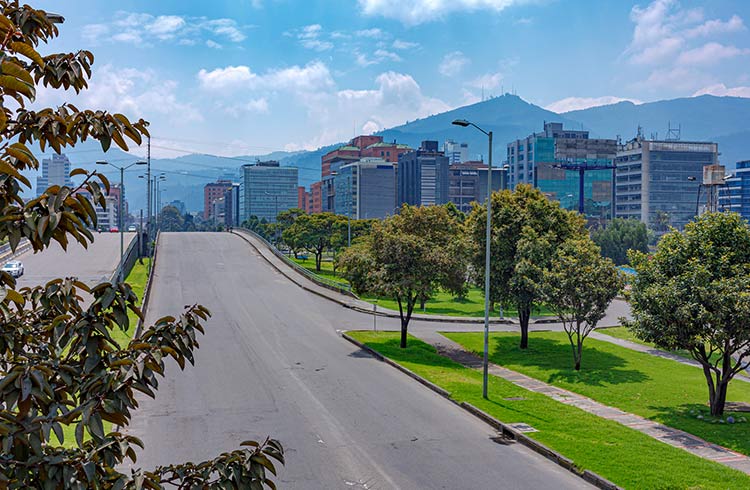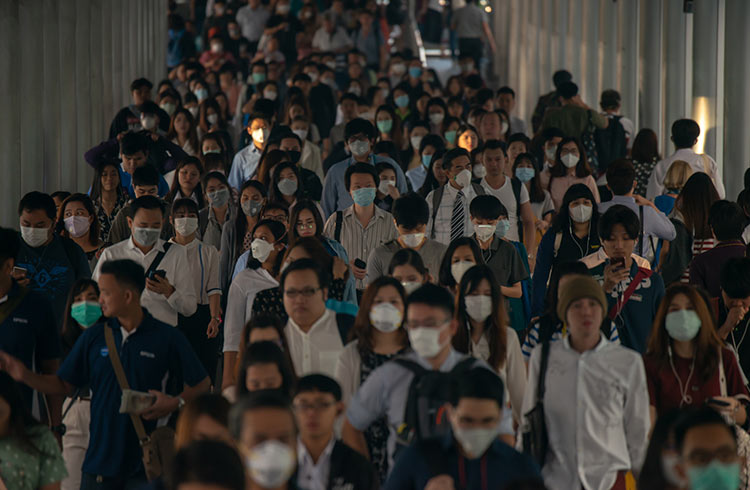Which Countries are Open for Tourism During COVID-19?
Get the latest information on how coronavirus (COVID-19) quarantine and restrictions are affecting travelers around the world.
 Photo © Getty Images/Devasahayam Chandra Dhas
Photo © Getty Images/Devasahayam Chandra Dhas
Please note, this page is no longer being updated
Am I covered for COVID-19?
If you are a World Nomads policyholder, read the latest insurance advice regarding COVID-19.
Before you buy a travel insurance policy, check your government travel warnings and health advice – there may be no travel insurance cover for locations with a government travel ban or health advice against travel.
Before you travel, you should know a few basic things about the country you plan to visit. Is its border open to foreign travelers? Does it currently have any COVID-related travel restrictions, and what are they? Is it experiencing a surge in COVID cases, and what percentage of its population is vaccinated? Below, you’ll find resources to help you get answers to those questions.
- Which countries are open to foreign travelers? What COVID-related travel restrictions are in place?
- COVID-19 case numbers and vaccination rates
- Which countries are open, closed or have restrictions in place?
- Am I covered for COVID-19?
- What should I do if I am traveling overseas soon?
Which countries are open to foreign travelers? What COVID-related travel restrictions are in place?
The best way to find the most up-to-date travel information is to visit your home country's embassy website or state department page for the destination you're traveling to.
- Travelers from the UK can visit gov.UK for foreign travel advice.
- Travelers from the US will find the most complete info by visiting US embassy pages, such as this one for Germany. US embassy pages often feature broader guidelines for international travelers as well as US citizens. Along with entry requirements, these pages also typically provide information on where to get a COVID-19 test at the destination, as well as any regulations and restrictions.
- At Reopen EU you can find out about restrictions for countries in the European Union depending on where you are entering from.
- African Union has information and resources on Africa's Covid-19 case numbers and vaccination rates.
- For travelers to Asia and South America, TravelBans has information on which countries are open to travelers as well as quarantine rules.
- Australian travelers can use the resources provided by Smart Traveller.
COVID-19 case numbers and vaccination rates
Our World in Data is an easy-to-use resource that provides the latest data on COVID-19 cases and vaccination rates around the globe.
This list was last updated on 27 September 2022. Which countries have COVID restrictions in place?
We are unable to update a list of restrictions and border openings for every country in the world, but below we have listed the most popular countries to visit (alphabetically), with information on how you can find out more about travel restrictions, COVID-19 cases numbers and vaccine rates. If you can't find what you're looking for here, please use the resources above.
Argentina: Argentina’s borders are open to all travelers, providing they comply with immigration requirements. As of 30 August 2022, the requirement to fill in an electronic ‘sworn statement’ form to enter Argentina has been lifted. There are no longer any COVID-19 specific entry requirements regardless of your vaccination status.
Australia: From 18 April 2022, travelers to Australia no longer require a pre-departure COVID-19 test to enter or transit Australia regardless of their COVID-19 vaccination status. From 6 July 2022, people entering Australia do not need to provide evidence of vaccination status or need to complete the Digital Passenger Declaration or Maritime Travel Declaration. Masks are still required on flights traveling to Australia.. However, states and territories can apply their own travel restrictions. Check requirements for states and territories here.
Canada: Starting 1 October, 2022, all COVID-19 border requirements, including vaccination, mandatory use of ArriveCAN, and any testing and quarantine/isolation requirements will end for all travellers entering Canada whether by land, air or sea. In the meantime, the online tool, ‘Find out if you can travel to Canada’ will help you find out if you can enter.
Chile: All travellers need to complete an affidavit (Declaración Jurada) up to 48 hours before boarding. As of April 14, 2022, the Chilean government no longer requires travelers to obtain a Mobility Pass (“Pase de Movibilidad”) in order to enter Chile. However, a valid Mobility Pass will still be required in many situations. To apply for a Mobility Pass visit ‘MeVacuno website’.
To enter Easter Island (Rapa Nui) all travellers will have to comply with the following requirements: Negative PCR test taken 24 hours prior to boarding (for children under 6 years of age, an antigen test from a health center will be allowed); and Mobility Pass or vaccination certificate and identity document for non-resident foreigners.
As of Sept 1 2022, it will no longer be necessary to fill out the C19 Declaration (Pasaporte Sanitario). Passengers will have to present their vaccination certificate issued in their country of origin. Those who do not have their vaccinations must present a negative result in a PCR test dated less than 48 hours before arrival in Chile. Random COVID tests for arriving international passengers will continue. If the result is positive, non-resident foreigners will be denied entry into the country.
Proof of vaccination and identification should be accepted as a Mobility Pass for non-resident foreign nationals, but some establishments (i.e. restaurants, bars) might still request an official Mobility Pass. Chilean authorities and/or travel companies will request a Mobility Pass in order to travel between regions in trips of more than 200 kilometres. Non-resident foreign travelers can present proof of vaccination and identity document in lieu of a Mobility Pass for internal flights within Chile. The only alternative to this requirement for interregional trips is providing proof of a negative PCR test taken in Chile no more than 48 hours before the interregional trip.
All children under 18 years old (including non-resident foreigners) are allowed to enter Chile without a mobility pass. They are not subject to any Covid-related entry requirements.
Non-resident foreigners should hold proof of travel insurance covering a minimum of $30,000 USD for COVID-related issues for the entire duration of your stay.
Colombia: Visitors to Colombia ages 18 or older will need to provide proof of complete vaccination for entry or a negative COVID test (48 hours in advance of travel for an antigen test or 72 hours in advance of travel for a PCR test). Travelers should be prepared to show their original, physical vaccination card or digital certificate both at airline check-in and when passing through Colombian Immigration. A photo of one’s vaccination card may not be accepted. If you completed your vaccination scheme within 14 days before entry to Colombia you will also need to have an antigen test 48 hours prior to arrival or a PCR test 72 hours prior to arrival in Colombia. (See US Embassy in Colombia web page for the latest information.). All eligible international passengers must fill out an immigration form online within 72 hours of boarding an inbound or outbound flight.
Costa Rica: From 1 April 2022, the Health Pass and travel insurance policy requirements are no longer required, meaning there are no COVID-19-related entry requirements for Costa Rica after this date. Check the Costa Rica tourism board website for any changes.
Croatia: Travelers are no longer required to complete an online entry form before arriving in Croatia, and are not required to show a COVID-19 vaccine certificate, proof of a negative test, or a certificate of recovery. This also applies to those who are not vaccinated and to those who have had COVID-19.
Ecuador: Upon entry to Ecuador, all travelers (except airline crew and children age two and under) must complete a Health Declaration Form with itinerary and local contact details. From July 18, 2022 all travelers over 3 years old entering the country by air must present: Vaccination certificate with its QR code or a valid vaccination card with at least 14 days validity after completing the scheme or a negative result of a RT-PCR test carried out up to 72 hours previous to departure to Ecuador. Find out more here. Alternatively, travelers who are not fully vaccinated but have had COVID-19 within the last year can enter but will need to show evidence of a positive laboratory PCR test (taken more than 14 days and less than a year ago). As of 1 July 2021, fully vaccinated travelers do not need to present a negative COVID-19 test to enter the Galapagos. If you have COVID-19 symptoms on arrival, you may be required to take a rapid antigen test. If the result is positive, you will be instructed to self-isolate for 7 days.
Egypt: Egypt's COVID-19 restrictions were lifted on 17 June 2022. Negative COVID-19 tests or poof of vaccine status are no longer required for entry. Find out if you require a visa and apply online via Egypt's Online Visa portal.
France: Since 14 March 2022, the “vaccine pass” has been lifted in France in all areas where it was previously required (cultural and leisure venues, commercial catering, professional trade shows, etc.). As of 1 August 2022, France has removed all COVID-related entry restrictions. There is no longer any testing or vaccination requirement for entry to France from any country. France reserves the right to reimpose entry restrictions if the health situation requires it. Visit the US Embassy in France page for more information.
Germany: From 11 June 2022, all COVID-19-related restrictions for entry into Germany have been lifted. You can travel to Germany for all travel purposes, including tourism and visits, without restrictions, and entry requirements fare the same for all travelers, regardless of COVID-19 vaccination status.
Greece: From 1 May 2022, travelers to Greece no longer need to show proof of COVID-19 vaccination, a negative test, or a certificate of recovery. Passenger Locator Forms are also no longer necessary. Visitors entering by air, land, or sea may be subject to random tests upon arrival. In the event of a positive result, they will be contacted and placed on a minimum 5 day quarantine, beginning with the next day of the positive test result. Check Greek authorities’ advice for further information.
Iceland: From 25 February 2022, there are no COVID-19 travel restrictions to enter Iceland. You don't need to provide proof of vaccine status for entry.
Indonesia: All travelers can apply for a 30-day visa on arrival, and this can be extended once. Arrivals must install the Peduli Lindungi app, show proof of a full course of vaccination (if over 18) and undergo a temperature check on arrival. Travelers running a high temperature must take a RT-PCR test and if positive, will need to isloate or be hospitalized at their own expense. Travelers who have received a full course of vaccination and a booster do not need an antigen/PCR test to travel domestically. Travelers who have not received a booster may need to show a negative test to travel domestically. Find out more at the Indonesian Ministry of Health website.
Ireland: From 6 March 2022, travelers do not need to show proof of vaccination, proof of recovery, proof of negative test or Irish passenger locator form receipt. There are no post-arrival testing or quarantine requirements for travel to Ireland. For more information, see the Irish Government website.
Italy: As of 1 June 2022, Italy's COVID-19 restrictions have been lifted. Italy does not require any proof of vaccination, a negative test result, or a COVID-19 recovery certificate to enter the country, regardless of vaccination status. However, travelers arriving in Italy, including minors, may be subject to random COVID-19 testing in airports and ports. If you test positive for COVID-19, you may need to stay where you are until you test negative. You may also need to seek treatment there. Until at least 30 September, the use of FFP2 masks are compulsory when entering Italy by ferry, train or coach, and on public transport within the country. For information on all requirements go to the Ministry of Health.
Japan: From 7 September 2022, fully vaccinated arrivals will no longer need to provide a negative pre-arrival PCR test. From the same date, tourists will no longer need to be part of a strict guided tour.
Mexico: There are no entry requirements for Mexico regarding COVID-19 vaccination status, and if you are vaccinated against COVID-19, no proof is required. For the latest information, check the Mexico Government's COVID-19 website.
Morocco: To enter Morocco, passengers are required to have had three vaccine doses (or have had their second vaccine dose within the previous four months), OR proof of a negative PCR test result, with the sample having been taken within 72 hours before boarding. Children under the age of 12 are exempt from these requirements. All passengers must download, print and sign a passenger health form before arrival in Morocco.
Nepal: Travelers can get a visa on arrival if they can prove their vaccination status. For the latest information on visa fees/fines please check the Nepal Immigration website. Non-vaccinated people can also obtain visas on arrival, but – if unvaccinated, and aged over five years old – must be able to show a negative PCR test completed no more than 72 hours before the flight of first departure.
Peru: If you’re fully vaccinated, you can enter Peru without needing to test or quarantine. Travelers aged 12 and above, whose final destination is Peru, must show evidence of full vaccination received either in Peru or abroad. Unvaccinated arrivals aged 12 and above, must have proof of a negative PCR test (taken no more than 48 hours before entry) when entering Peru.
Philippines: The Philippines’ Government Resolution 168 explains the detailed entry rules in response to COVID-19 for travelers. All travelers must be fully vaccinated, except for minor children below age 12 traveling with fully vaccinated parents who can present acceptable proof of vaccination. If you are fully vaccinated with at least one booster shot, you are no longer required to provide a negative RT-PCR test, provided you present proof of vaccination along with your valid passport and return tickets. Travels must also register for a Bureau of Quarantine One Health Pass. Foreign nationals who are not fully vaccinated are not able to enter the Philippines.
Portugal: Beginning 1 July 2022, COVID-19 entry requirements have been lifted. A negative COVID-19 test, certificate of vaccination, or certificate of recovery is no longer required. This includes arrivals to Madeira and the Azores. For further information, check the Portuguese Airport authority passenger guide.
South Africa: As of 22 June 2022, all remaining COVID-19 regulations have been repealed. Travelers entering South Africa are no longer required to produce vaccination certificates or recent negative PCR tests. Health screening procedures at airports and other ports of entry have been discontinued.
Spain: All travelers (excluding children under 12 years old) must show proof of vaccination, or a negative PCR COVID-19 test taken within 72 hours or a RAT test taken within 24 hours of departure or show they have recovered from COVID-19 in the last six months.
Sri Lanka: Travelers should apply online for an Electronic Travel Authorisation (ETA) to enter Sri Lanka on the ETA website. Fully vaccinated travelers are no longer required to take a pre-departure COVID-19 test before arrival. Unvaccinated travellers aged 12 and above entering Sri Lanka, will need to show proof of either a negative PCR test (taken no more than 72 hours before embarkation), or a negative Rapid Antigen Test report (taken within 48 hours before embarkation). Self-swab tests will not be recognised. As of 17 June, COVID-19 travel insurance no longer mandatory for all visitors.
Switzerland: It is no longer necessary to provide proof of vaccination, recovery or a negative test or complete an entry form to enter Switzerland.
Tanzania: All passengers arriving in Tanzania must present proof of vaccination. Unvaccinated arrivals over the age of 12 must present a negative PCR test taken within 72 hours of arrival or take a Rapid Antigen Test on arrival at their own expense. All passengers must complete an online Traveller’s Surveillance Form submitted no more than 24 hours before arrival.
Thailand: From 1 October, passengers will be no longer required to present COVID-19 related documents such as a certificate of vaccination and COVID-19 test results upon arrival in Thailand. Entry requirements for Thailand are the same for all travellers, regardless of COVID-19 vaccination status.
Turkey: As of 1 June 2022, all COVID-19 restrictions in Turkey have been lifted, and travelers are no longer required to present proof of vaccination or negative PCR test results. However, COVID-19 entry requirements may change at short notice. Further details are available on Turkish Airlines or Pegasus websites.
United Arab Emirates: From 26 February 2022, vaccinated travelers and those with a COVID-19 recovery certificate less than 30 days old, do not need to take a PCR test. Unvaccinated travelers must present a negative COVID-19 PCR test, taken no more than 48 hours before departure. Further information about COVID-19 updates is available on the UAE Coronavirus (COVID-19) updates webpage and on the National Emergency Crisis and Disasters Management Authority website. Further information about testing facilities in the UAE is available on the UAE Government Portal.
United Kingdom: From 18 March 2022, travelers to the UK will not need to take any COVID-19 tests or fill in a passenger locator form when traveling to the UK from abroad. These changes apply whether you are fully vaccinated or not.
United States: From 12 June 2022, travelers to the USA will no longer require a pre-departure COVID-19 test. Most fully vaccinated foreign citizens can enter the USA. The US authorities will accept any COVID-19 vaccine approved for emergency use by the World Health Organization or approved by the US Food and Drug Administration (FDA). Restrictions may change at short notice so you should check this regularly in case of further developments. You need to apply for a visa or an Electronic System for Travel Authorisation (ESTA) visa waiver to enter or transit the USA as a visitor. You should consult the US State Department website to determine which you will need. There are restrictions on who can enter or transit the USA.
Vietnam: Entry requirements for Vietnam are the same for all travelers, regardless of COVID-19 vaccination status. See All travelers. From 15 May you no longer need to take a COVID-19 test before traveling to Vietnam. From 15 March 2022, Vietnam has reintroduced visa waivers for 13 countries. Visa waivers allow for visits to Vietnam for up to 15 days without needing to apply for a visa. See Visas section for more information.
Related articles
Simple and flexible travel insurance
You can buy at home or while traveling, and claim online from anywhere in the world. With 150+ adventure activities covered and 24/7 emergency assistance.
Get a quote



No Comments